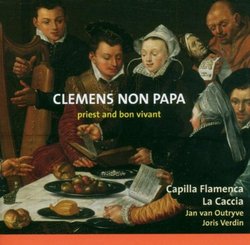| All Artists: Joris Verdin - organ;Jan van Outryve - lute;Capilla Flamenca;La Caccia Title: Clemens Non Papa: Priest and bon vivant Members Wishing: 0 Total Copies: 0 Label: Etcetera Original Release Date: 1/1/2007 Re-Release Date: 5/29/2007 Genres: Special Interest, Pop, Classical Styles: Vocal Pop, Opera & Classical Vocal, Chamber Music Number of Discs: 1 SwapaCD Credits: 1 UPC: 8711801101033 |
Search - Joris Verdin - organ;Jan van Outryve - lute;Capilla Flamenca;La Caccia :: Clemens Non Papa: Priest and bon vivant
 | Joris Verdin - organ;Jan van Outryve - lute;Capilla Flamenca;La Caccia Clemens Non Papa: Priest and bon vivant Genres: Special Interest, Pop, Classical
Jacobus Clemens (15? 1555) is one of the greatest polyphonists of 16th century Flanders. But this CD is more than a CD devoted to Clemens' works. The recording is an integral part of the more broadly-conceived festival Tow... more » |
Larger Image |
CD Details
Synopsis
Product Description
Jacobus Clemens (15? 1555) is one of the greatest polyphonists of 16th century Flanders. But this CD is more than a CD devoted to Clemens' works. The recording is an integral part of the more broadly-conceived festival Townscape - Scoundscape / Sounds of the city of Louvain from the 16th century, in which attention is primarily focused on Petrus Phalesius, the Louvain music publisher and on musical life in the oldest university town of the Netherlands. Clemens was the composer whose name appeared the most in Phalesius' publications, next to Thomas Crecquillon who was also strongly represented in music published in Louvain. Works by Clemens non Papa are therefore combined with songs by Crecquillon and a selection of the highly varied array of instrumental music that came off Phalesius' presses. This CD offers an image of the colourful supply of polyphonic music that was to be heard both inside and out in Louvain and elsewhere in the Low Countries halfway through the 16th century. The artistic excellence of the Capilla Flamenca in the field of Early Music is undisputed. The four male singers enlarge their quartet according to the needs of the programme with singers, windinstruments, string instruments or an organ. The ensemble integrates music, dance and theatre. The personality of the musicians and the interaction between them creates a polyphonic soundimage in a dynamic way and an authentic interpretation. Capilla Flamenca won the prestigious international award Il Filarmonico for both the high artistic value of their performances and the cultural value of their musicological research. After various activities as accompanist, arranger and producer Joris Verdin now focuses on the organ and the harmonium and has become internationally reputed as a specialist, spanning many musical eras and styles. Jan Van Outryve studied with Toyohiko Satoh and collaborated with a.o. Les Arts Florissants, Il Fondamento and Capilla Flamenca. Van Outryve recorded several cd's with them. La Caccia was founded with the intention to perform music from the late Middle Ages and the Renaissance. Often their programmes have a special theme. La Caccia works mostly with an alta-capella strength (reed- and brassinstruments) to which sometimes strings and singers are added.

 Track Listings (26) - Disc #1
Track Listings (26) - Disc #1